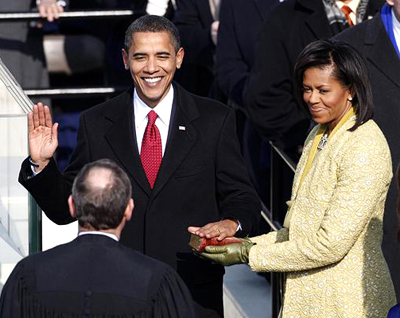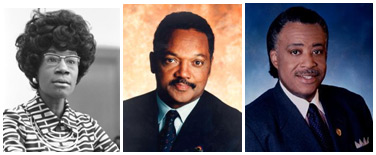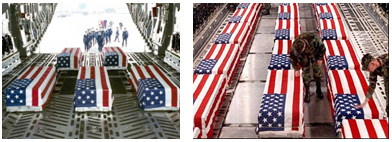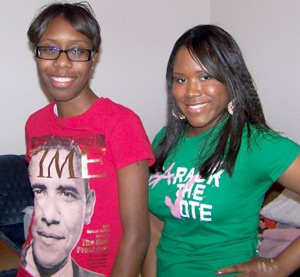Cultural Resources
WATCH NIGHT
CULTURAL RESOURCES
Thursday, December 31, 2009
Israel Kamudzandu, Guest Cultural Resource Commentator
Assistant Professor of New Testament Studies, Lindsey P. Pherigo Chair, Saint Paul School of Theology, Kansas City, MO
I. Introduction: Memories
On what is the final service of the year (except for those holding Kwanzaa services), many historically African American congregations can be found praying, testifying, singing and preaching in the new year. They also reflect upon the past 364 days.
Those of us from Africa, particularly Zimbabwe, live with the political upheavals of the past. These painful memories have affected our lives and challenged our identities as black people. Like the haunted ghost in Toni Morrison’s Beloved, these memories come back again and again to demand that we address and name them. Yet, God has been with us, redirecting and comforting us throughout years of colonial struggle. How quickly we forget that we are not alone as sojourners in this world.
The Children of Israel had similar painful experiences. Life for them, like for many Africans and African Americans, was colored with ambiguities and unpredictable twists and turns that needed to be positively constructed for the sake of future generations. Memory is a powerful engine in such construction, because it resists institutionally sanctioned forgetfulness. For most oppressed people, memory is inscribed on one’s private self and is tattooed on our bodies.
The Children of Israel, Isaiah and others in ancient Israel were also cognizant of the time and season of their era. Moses and Isaiah knew that distress covered Israel’s memory. Both figures made it plain to the Israelites that, unless there was a new birth and realization of God’s mighty works in their midst, as well as a significant change in priorities, their lives were heading for disaster. These prophetic words are recorded in Exodus 13 as well as in Isaiah 43:18-21. The text of Isaiah makes it plain that a culture of murmuring and rehearsing the ills of the past will not bless and glorify God.
In Isaiah 40: 29-31, the writer has a hymn of “waiting upon the Lord” as a metaphor for “Watch Night.” In being true to our ancestors, we need to wait as Spirit-filled people whose hopes are fixed on God, who was present with our ancient spiritual ancestors in both mobile tabernacles as well as fixed temples.
II. Remembering and Forgetting the Past Year

There is much to remember about 2009. As the year opened, Africans and African Americans saw an occurrence that many never believed they would see in their lifetime —the inauguration of one who was African and African American as the president of the United States. Those who did not go to Washington for the celebration, though so many did, watched until the wee hours of the morning, everything from the swearing in to the Presidential first dance. We did not want to miss a thing. We bought t-shirts, posters, key chains, books and more all as testament to this historic moment. We were filled with pride. We stood a little taller. We got our swagger back. Young folk believed again in what they could achieve. Old folk, knowing that the battle was not over, still shouted hallelujah for this unimagined victory and thanked the Lord that President Obama had not been assassinated during the election campaign.

We cried in Africa and in America. We cried remembering black folk brought to the Americas packed like sardines in blood and urine soaked ships and all of those who were murdered and hung as “strange fruit” from trees in the south and north for so many years. We remembered all of those who suffered and still suffer under colonialism and apartheid. We remembered every American election where we had previously made breakthroughs as mayors, governors and senators. We remembered all of the civil rights marching and the dogs and the water hoses and the racists who blocked school doors, restaurants and voting booths. We remembered all other blacks who had run for president in America who we knew could not win-- from Shirley Chisholm, to Jesse Jackson and Al Sharpton.

But there is also much we want to forget about the past year. What many perceived as the worst economic crisis since the Great Depression gripped the world. Entire industries vanished and we know they will not return except possibly in some re-invented form. Business chains with familiar names declared bankruptcy. Money that was already hard for black businesses to get became hard for almost everyone to get. The number of homeless exploded. Seniors saw pensions decline and many seniors had to return to work or keep working to survive. For the first time in a long time, many whites discovered that they were not part of the middle-class after all and may never be. Long standing, well-paying union jobs disappeared in staggering numbers and we know they will never return. This was a wake-up call to many who, with little education, had always done okay. Elementary and high school educational systems continued to decline in America but educational costs continued to soar at colleges and universities pushing the dream of a college education out of the reach of many. The financial sectors were bailed out and placed under scrutiny; but likely will continue their reckless, greedy behavior due to lobbying efforts to prevent an overhaul of our financial systems and because our political leaders who receive campaign funds from this sector will not jeopardize their personal political futures to serve the greater good. And then, there was the fight to achieve national health care and two never-ending, perhaps unwinnable wars.
But I believe we also have even more for which to be thankful as we anticipate a new year with all of its possibilities. I am the child of a people who believe in turn-around, and that God can “do a new thing.”
III. God Doing a New Thing – Looking to the Future

(A) During the campaign of Barack Obama, I witnessed the involvement of young people in the electoral process in numbers and with energy that had not been seen since the modern civil rights protests. They were everywhere handing out signs, registering people to vote, blogging, e-mailing, phone calling, marching, raising money and hosting election events. You name it, they were doing it. This re-involvement of young black folk touched my heart almost as much as I was touched by President Obama becoming President. Why? Because we know from experience what a few committed young folk can do. Some have forgotten or may not be aware that it was mainly young folk who galvanized the civil rights movement. Dr. King was not thirty when he became a civil rights leader. It was young people, often ages 18-25, who boldly sat down at lunch counters in stores in the south and north that did not serve blacks. It was young people who took freedom rides under threat of death. They went up against the dogs, the water hoses and those who tried to stop them from entering high schools and colleges. Young people did all of this.
So as 2010 approaches, I am hopeful that in spite of all of the occurrences in 2009 that have been disheartening, that we will somehow harness this new enthusiasm by young people so that they can take their rightful place as our new mayors, business owners, teachers, lawyers, doctors, senators, members of Congress and presidential candidates.

(B) I believe that the nation’s economy will rebound and that Americans will begin to save more and spend more thoughtfully. Although none of us would have requested a horrific economic downturn to turn us around, we did need to turn around. Many of us were and are wasteful people. We throw out food, purchase clothes that we rarely wear, and buy things just because we have the credit cards with which to shop. We pay high cell phone bills to talk and text about very little. We purchase gadgets and games just to own them. And e-commerce took our wasteful spending to all time highs, whether it was Itunes, Amazon.com, or the Home Shopping network, we were hooked on shopping from our places of abode. To make matters worse, we taught our terrible habits to our children by buying them shoes, games and cell phones that we could not afford. While we were doing all of this, we were not saving. Blacks were not saving, nor were whites, Latinos, Asians—no one was saving at reasonable rates. Let’s hope that, even as we kick and scream, we will continue to save and think about what we buy and depend less and less on credit cards. This should also allow us to demand more from businesses who continue to ask us to shop, shop, shop as they produce inferior products and offer very little services and, in too many cases, reap enormous profits from those who really have so little to spend but are caught up by the American capitalist advertising machine. This machine, as we should know by now, is particularly effective in a country where so many are un-educated and under-educated.
We wait in holy anticipation of a God who makes all things new. Rather than complaining and groaning with the pains of the past year, each of us needs to develop a culture of praise and honor to God who is always present with all generations, the “Emmanuel” of all believers. As we wait for the dawning of 2010, God demands that we Christians of African descent must join in affirming what the author of the letter to the Hebrews wrote:
but in these last days he has spoken to us by a Son, whom he appointed heir of
all things, through whom he also created the worlds. Hebrews 1:1-2 (NRSV)
As African Americans, we share a proud heritage, and we have come a mighty long way in a global world where we have been misidentified, but we prevailed. God has been and will be with us. Let’s tell the story with pride and give glory to God. We await the New Year with a renewed sense of commitment, joy, longing and praise.
Thematic Words to Guide the New Year: Leave the Wilderness; Claim the Promised Land, Seize the Moment, The Horizon Shines Brighter Because God is Calling You.
IV. Nyaya (Story People)
Africans, wherever they are, have a rich heritage of storytelling. In Shona Zimbabwean cultures, elders are known as people of storytelling or nyaya or ngano. In storytelling, the speaker does not need a notepad or prompter. One needs to have an aim and purpose in telling a particular story. Included in the stories are proverbs, metaphors, images and songs. The storyteller must have a deep sense of wisdom and prophetic imagination in order to tell the story well. As African Americans, we have a great story to tell. However, the story is not ours alone. It is also the story of God and God’s manifestations in our life experiences – of being lynched, raped, abused, forced to labor in cotton, rice and tobacco fields and being drafted into wars. Through it all, God was always on our side—upholding us and unleashing a great cloud of witnesses (Hebrews 12: 1).
Passing the Baton: Future generations need to be taught the story of our struggles and how God worked to bring us to the other side of the land. We are truly sojourners, but sojourners of a different kind. Our history is a divine history – a story that symbolizes the true meaning of baptism. We have been through Jordan’s rivers and submerged in the same waters in which our ancestors of faith waded, and God made clear that his love is available for everyone. God’s intent is that love’s power will carry the day, not only for the beloved ancestors of the Exodus, but for all of those who, like the very human Jesus – the lamb of God whom water washed and the Holy Spirit filled -- will dare to carry the burning fire of God’s love into the world. Those who have lost beloved ones through death and those who have passed through the Exodus of losing jobs, foreclosed homes and loved ones in Iraq and Afghanistan must remember that God is with them.
By entering the waters of baptism, Jesus was both a mirror to our humanity and a window to God’s divinity. Our ancestors of faith passed through Red Sea waters, not just because they were intelligent but they also had trust in the God of the future. Like the Exodus, baptism reminds us of “former things,” and continues to accompany us in our twenty-first century journeys as a reminder that God’s windows of opportunities are not closed. God’s grace and power will win in the end. As believers of the Story, we come to the waters, desserts, wildernesses of life with a great sense of faith. We are called to wade in the waters of grace that are Spirit-filled with the love of God, and like Jesus we will put in proper perspective the stigmas of Galilean villages and the future will unfold before us.
V. Cultural Response to Our Lection Text
Isaiah 43:18-21 is full of prophetic imagery, and the imagery affirms that the God of salvation and liberation transpired in Jesus and will become a reality in our present and future lives. Africans in the motherland organize Independence Day celebrations so as to tell the stories of struggle, and those in the African Christian faiths tell stories of how organized groups of people would disguise themselves as if they were going to fetch firewood but were actually going to pray and worship God. In these services, they engaged in powerful and dearly beloved rituals. Rituals are crucial to Africans and African Americans in that, through them, we affirm and reconstitute our spiritual and cultural symbols as we gather to await the coming of the New Year.
As Matthew tells his listeners that Jesus saw “the Spirit of God descending like a dove” and heard the voice affirm him as the Beloved, we too must be attuned to the voice of God calling us his beloved as we anticipate the dawning of 2010. We are the embodiment of the prophetic dream of the prophet Isaiah and the incarnation of the promised one whom Isaiah sings about in 42:1–9. We have a mandate to tell the story to future generations through all of our rituals.
Christians in a new age are charged with not only remembering the past but with the task of doing justice in the present. Isaiah the prophet cautions us to no longer talk about the wondrous miracles of water at Marah but to talk about fledgling rivers in the desert (vv. 19 -20). Rather than murmuring, we now have to establish a tradition of giving praise and glory to God as we do justice. We waded in the waters of grace and Jesus was with us so that we can always remember his presence with us and know that we are daily being reformed in his image. The New Year will have its baptismal moments, but we all have been sealed to wade in the waters of grace. In every place and context, African Americans have a story to tell. It’s a story of truth and justice, a story of love and light.
We can be our worst enemies if we fail to learn and remember the gracious hand of God in the past. Our hurts, lingering grudges, and divisive misunderstandings may block us from what God wants and needs from all of us. Yes, wounds, whether festering or forming, must be healed, cauterized, forgiven and thrown into the dustbins of history so that we can experience God’s newness in our futures. In our congregations, homes and work places we must endeavor to be like Jesus and become a people of an inspiring story and justice-making in a world hungry and thirsty for God and daily physical sustenance.
As we wait, let us agree that in here and out there, we will practice a culture of praise and live for the least of these. In all we do, we will emulate our ancestors in faith and be agents of transformation in a world in need of the light of Jesus. Like our ancestors, we must be on fire for Jesus and nations will gather to watch us as we burn with passion for the word of God and compassion for God’s people who are perishing in hunger, wars, HIV/AIDS, street violence, divorce, and drugs.
With the marvelous gifts present among people of African descent, there is no doubt that when we grow to tell our stories with praise, and grow to forgive the past and each other, God will bless the legacy and future of our world. Our stories will open the eyes of so many who are still blind to the common humanity we are called to display.
Lastly, our stories are an invitation to all who have been victimized to come and wade in the waters of grace, anticipating God’s glorious future unfolding before us. Everybody is invited to a fountain of new hopes and dreams, a fountain of love and forgiveness, and to step forward to a new baptism, so that God can water – wash and fill us with His spirit for Discipleship – making in his Church. Amen.
VI. Traditions to Accompany a Watch Night Service
- Consider having a laying on of hands for worshipers; anointing with oil; and a healing service.
- As you sing, consider the following are possible hymns, all of which can be found in the most recent United Methodist Hymnal and other hymnals:
“Faith of Our Fathers” #710;
“We Have a Story to Tell to the Nations” #569; and
“Standing on the Promises of Christ My King” #374.
Numerous songs can also be found in the worship unit for Watch Night 2009 (Year 2).
- Consider developing a theme for your Watch Night Service. Possible themes are:
“It’s Turn Around Time”;
“A New You for a New Year”;
“Faith on Fire for a New Year”;
“Still Telling the Story”;
“Remembering, Reclaiming and Resurrecting; and
“Be God’s Change And Love in the World.”



